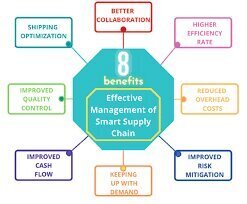Smart Supply Chain Management (SSCM) leverages advanced technologies, particularly Artificial Intelligence (AI), to optimize supply chain operations. This approach integrates connected systems that track shipments, inventory, and logistics, significantly enhancing efficiency and responsiveness.
Key Components of Smart Supply Chain Management
1. Demand Forecasting
AI plays a crucial role in demand forecasting by analyzing historical sales data, market trends, and customer behavior. This predictive capability allows businesses to adjust their inventory levels proactively, minimizing excess stock and reducing costs associated with overproduction or stockouts. By utilizing machine learning algorithms, organizations can generate accurate forecasts that inform production schedules and supply chain operations[1][2].
2. Dynamic Inventory Management
Connected tracking devices and supply chain management systems enable real-time visibility into inventory levels. AI facilitates dynamic inventory planning by merging various data points, such as lead times and reorder points, with demand forecasts. This integration helps businesses maintain optimal stock levels and enhances decision-making, ensuring that resources are allocated efficiently[2][4].
3. Logistics Optimization
AI enhances logistics through route optimization and predictive analytics. By analyzing real-time data from various sources, including traffic conditions and weather forecasts, AI algorithms can determine the most efficient delivery routes. This capability not only reduces transportation costs but also improves delivery times and customer satisfaction. Additionally, AI-driven predictive maintenance can identify potential equipment failures, minimizing downtime and ensuring smooth logistics operations[2][4].
4. Risk Management
AI technologies are instrumental in identifying and mitigating risks within the supply chain. By analyzing historical data and monitoring real-time events, organizations can develop proactive strategies to address potential disruptions, such as supplier failures or demand fluctuations. AI enables businesses to simulate various scenarios, allowing for dynamic routing and alternative sourcing options that enhance resilience in the face of uncertainties[1][3].
5. Integration of Autonomous Technologies
The future of SSCM includes the integration of autonomous vehicles and smart warehousing systems. These innovations are set to revolutionize last-mile delivery and warehouse operations, providing enhanced flexibility and efficiency. Companies are increasingly investing in these technologies to streamline their supply chain processes further and maintain a competitive edge in a rapidly evolving market[4][5].
In summary, Smart Supply Chain Management harnesses AI to create interconnected systems that optimize every aspect of supply chain operations. By improving demand forecasting, inventory management, logistics, and risk mitigation, organizations can achieve greater efficiency and responsiveness in a complex business environment.
Further Reading
1. Smart Supply Chain Management Optimization and Risk Mitigation with Artificial Intelligence | NATURALISTA CAMPANO
2. Smart Manufacturing Revolution: AI-Driven Supply Chain Optimization
3. https://www.researchgate.net/publication/378747190_Smart_Supply_Chain_Management_Optimization_and_Risk_Mitigation_with_Artificial_Intelligence
4. Enhancing operational intelligence in supply chain management through AI/ML – Supply Chain Management Review
5. The Center – Revolutionizing Efficiency: The Role of Artificial Intelligence in Supply Chain Management


